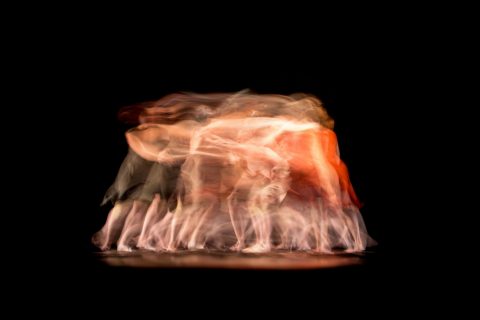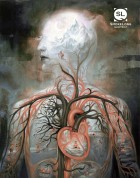Can you walk us through the process of writing this story? Where did the idea come from? How long did it take you to write? What challenges did you face? Is the process for writing this story typical of the way you write in general?
Stories and poems tend to begin with images for me, often nostalgic images because I miss Russia. In this case, I kept thinking about an image of USSR high school girls cramped into a tiny bathroom to learn a secret. I wrote the first draft in Russian, in three days, then took a couple of weeks to translate it, fill it in, spice it up, and tighten it. I do typically write in Russian to begin with. I just give up control and write very quickly, intuitively. Translating what I write always comes with a challenge of finding the right tone and even the right metaphors because I’m writing for an English-speaking audience.
I know you grew up in Russia, and the story reads as though it could be autobiographical. How do you utilize and fictionalize your own experience?
My memory is not that great, and I don’t remember as much as I’d like to about growing up in the USSR, but I remember some episodes vividly, and these memories get my imagination going. I start wondering about motivations of people, I start asking “Why?” and then I begin to play, imagining “What if this happened or that?” and eventually I come up with a story I feel I should share. Sometimes I take an episode from my life and describe it, but it has to work for the story. For example, I vividly recall seeing a dead, wet mouse on the desk of our teacher in seventh grade. I remember how exciting it was for all of us, her students, to see her shock and helplessness. In that moment we had complete control over her, or so it felt. Teachers in USSR were very strict, merciless even, so this reversal of power felt quite satisfying. So, I revisited that poor dead mouse in this story, re-fashioned it into Lida’s little project to show to Lida’s genius at being in control.
What are your personal feelings—as the writer, or maybe as the reader of your own story—toward your characters, both the narrator and Lida?
I think the narrator is such a child, especially in contrast to Lida! She does give us pretty intimate, honest details about her crush on Lida, but, at the same time, she is looking back and feeling, I think, amazement and wonder recalling how possessed by Lida she once was. And I was hoping that maybe the reader would feel amazed along with the narrator and start wondering about the mystery of love in general, about that mad pull towards another person. Always this question: How is this pull even possible? But then Lida’s most defining quality is that she is at the very top of a hierarchy in her world and exerts a certain power from above over teachers, boys, and girls. Yet in the end it appears that one person, a boy she loves, has power over her. So, there is depth to Lida because she can be vulnerable and because she is devastated by her realization that love doesn’t exist. She can’t be right of course—love is real!
The story ends when the narrator realizes something new about Lida, but we are not told how she processes this new information. Do you feel certain the narrator feels one way or another about it?
I was hoping to leave the reader wondering what the narrator might be feeling after the revelation. What does she think of Lida now? This question comes up because the power dynamic shifts when those girls realize that Lida is in pain because a boy she loves abandoned her. Since Lida exposed her vulnerability, her power probably diminished a bit. Actually, I think it is possible that the narrator would find herself less interested in Lida after the bathroom revelation. She might now find herself interested in the boy who had sex with Lida, the boy Lida loves. I think the narrator might want to get to know this interesting boy, and of course make him fall in love with herself. Maybe I should write a sequel to this story!


